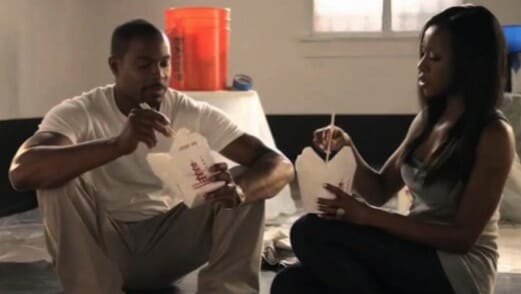Black Coffee

Screeching meets social-minded speechifying in writer-director Mark Harris’ Black Coffee, which can’t decide whether it wants to be a fluffy and disposable romantic comedy about kicking a gold-digger to the curb and finding love with a likeminded young professional, or a slightly more serious-minded relationship movie-cum-treatise on the present-day African-American urban experience.
When he’s fired from his job and dumped by his materialistic girlfriend of two years on the same day, Los Angeles commercial painter Robert (Darrin Dewitt Henson) is momentarily thrown for a loss. In short order, though, through his cousin Julian (Christian Keyes), who sells his own line of specialty coffee, Robert meets lawyer Morgan (Gabrielle Dennis). He pitches some woo, and after cooking one meal for Morgan at an early hour so as to avoid it being classified as a date, the two seem to have mutual locks on each other’s hearts.
There’s a lot more movie left, however, so Morgan comes clean about the complicated nature of her relationship with her controlling ex-husband, Hill (Lamman Rucker), to whom she signed over a bunch of property in their divorce. And Robert’s ex, Mita (Erica Hubbard), keeps buzzing around like a gnat, even though she has a new man. As Robert endeavors to keep Mita out of his life, and takes advice from Julian on exercising his own entrepreneurial muscles, he and Morgan have to decide whether they’re right for one another or simply on the rebound.
It’s obviously important to Harris that Black Coffee makes a statement about African Americans supporting African-American entrepreneurs and businesses, which is fine. But this theme is rather unsophisticatedly interwoven, and Harris blunders his way into all kinds of uncomfortable racial politics by having Robert fired by a same-aged white boss, Nate (Josh Ventura), who we’re told runs the business started and built into a success by Robert’s father—a fact that makes absolutely no sense.
This early problem quickly takes a backseat to a litany of other misplayed details, however. Notable among these is the fact that Julian apparently makes bank ($50,000 in the last six months, he twice notes) by charging $30 for a one-pound bag of coffee, and never seeming to sell anything in bulk. With astonishing consistency, Harris’ movie finds little ways to ring false. Then, at the 70-minute mark, it breaks the fourth wall for no particular reason or advantage (it’s not even a main character who does it), and stumbles awkwardly into an extended musical montage of its detestable secondary characters falling in love. Wait … what?
-

-

-

-

-

-

-

-

-

-

-

-

-

-

-

-

-

-

-

-

-

-

-

-

-

-

-

-

-

-

-

-

-

-

-

-

-

-

-

-








































